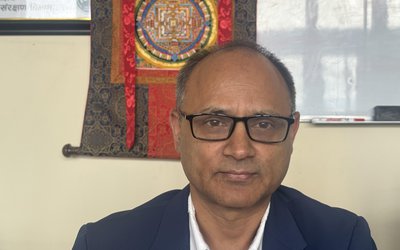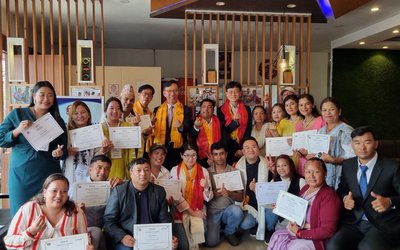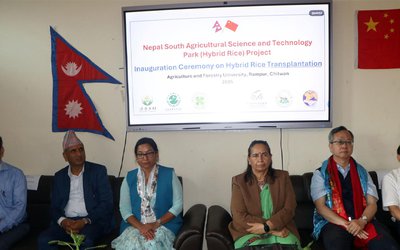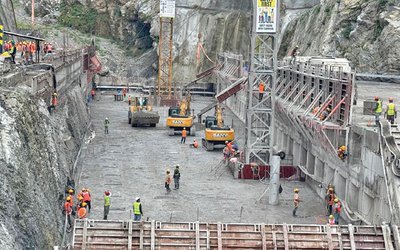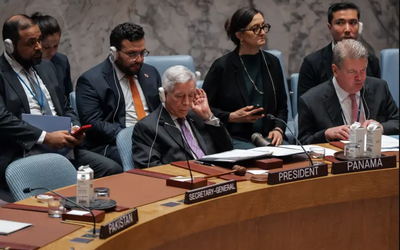
What are your thoughts on attending Nepal's Sagarmatha Sambad summit, the country's first flagship program on climate change?
I find it commendable that Nepal is taking a leading role in addressing global issues, especially related to mountains. The summit brings together various stakeholders to discuss and find solutions to shared challenges, showcasing best practices at regional and national levels.
Can you explain the purpose of GGGI?
The Global Green Growth Institute (GGGI) is an international organization that promotes sustainable economic growth in developing countries and emerging economies. Established by a treaty, GGGI works with its 50 Members and 29 Partner States to advance the green growth agenda and support inclusive development.
What is the mission of the organization?
The organization's mission is to promote a global transition to a green growth model that combines poverty reduction, social inclusion, environmental sustainability, and economic growth strategies at the country level. The Global Program framework under Strategy 2030 focuses on five key operational priorities: catalyzing climate finance and green investments, promoting climate and green finance, enhancing policy and capacity, advancing the Circular Bio-Economy, and addressing sustainable development, poverty, and gender issues.
What are some other experiences in Nepal?
Nepal Infrastructure Bank Limited (NIFRA) has received regulatory approvals for Nepal's first Green Bond issuance in collaboration with the Global Green Growth Institute (GGGI) and the Korea International Cooperation Agency (KOICA). GGGI helped NIFRA develop a Green Bond Framework based on ICMA Green Bond Principles, defining criteria for project selection, fund management, and reporting.
Hosting Sagarmatha Sambad is beneficial for Nepal to address its issues, but how can such a program contribute globally to raise awareness and address issues?
This can be analyzed on three levels. Firstly, considering the global agenda and challenges, issues like climate change impact mountain glaciers, which in turn affect the entire planet. This challenge is not limited to Nepal but has global implications. By discussing and sharing various perspectives on such topics, it can highlight the urgency of these issues and the need for collective action. Having a leader like Nepal hosting such discussions can help in bringing attention to these critical issues on a global scale.
What is Nepal's role in this transformation?
Nepal is playing a leading role and is a champion in influencing the global agenda on climate change. This will be a topic of discussion among political leaders, academicians, activists, and ministers. The gathering will result in a declaration outlining common goals and commitments to address the issues. This declaration serves as a foundation for countries to come together and support solutions. Additionally, the event will send a signal to communities impacted by climate change that efforts are being made to address the issues collectively. Nepal's central role in this convention is crucial, and the country is well-suited to host such an event.
Having been present in Nepal for a decade, how do you perceive the impact of inter-governmental organizations like GGGI in the country?
When we first started, there were extensive discussions on developing appropriate policies for climate change and energy in Nepal. These discussions have now transitioned into concrete actions. We are moving from policy formulation to implementation of climate change initiatives. An encouraging development is the increasing involvement of private sector entities, especially commercial banks, in addressing climate change issues. This indicates that the government's policies have created incentives for private sector engagement. The fact that private sector entities find it appealing to participate in this sector suggests that they can play significant roles. The government now needs to clarify the specific roles that private sector entities can play, making it a crucial agenda for the future.
What are your thoughts on the new opportunities emerging in various sectors?
I see a lot of potential in the near future for advancements in technology transfer. There is a growing focus on decarbonizing the transportation sector, which is gaining importance. While the general public may not be fully aware of this shift, governments are increasingly moving towards cleaner transportation methods to align with new projects funded by donors. This trend is not limited to transportation, as other sectors like energy transformation and building construction are also undergoing significant changes. Energy-efficient smart buildings are becoming more prevalent, highlighting the importance of sustainable practices. Although hydropower remains a crucial component of green energy production, its reliance on water availability poses a challenge in the face of climate change. Nepal should consider diversifying its energy sources, including solar power, to mitigate risks associated with water scarcity. It is essential for the government to develop comprehensive policies that address these evolving scenarios. This is an opportune moment to assess and strategize for the future.
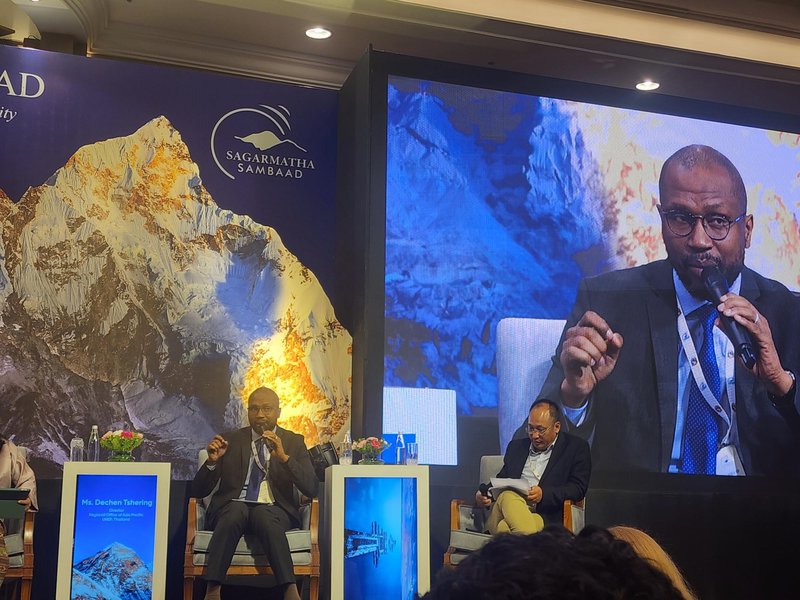
It appears that funding for the climate change sector may become limited in the future. However, there are concerns about organizations duplicating projects with the available funds. How can inter-governmental organizations like yours help ensure that resources are used efficiently and prevent duplication of projects?
As an inter-governmental organization, we can recommend that governments maximize the use of funds and ensure they are directed towards the right priorities. Governments play a crucial role in centralizing and coordinating investments to achieve more harmonized interventions and behavior change. Successful countries have implemented non-negotiable policies and programs at the national level to guide donor investments towards government priorities. Governments should register all upcoming projects and outline how they plan to implement them in priority areas for investment. By giving approval only to projects that add value, governments can avoid duplication of funds. Without such mechanisms in place, there is a risk of multiple institutions supporting the same project, leading to inefficiencies. Just like building a house requires proper planning and coordination, utilizing funds effectively is essential for achieving the desired outcomes in the climate change sector.
With Nepal advocating for the loss and damage fund, there is a question of whether SMEs receive compensation of Loss and Damage Fund?
One perspective is to consider how funds could be utilized to mitigate climate hazards and support communities in recovering from disasters. The focus of the loss and damage agenda is primarily on affected communities, but it is crucial for the government to also consider supporting Small and Medium Enterprises (SMEs) and the informal sector, which play a significant role in the economy. Providing assistance to SMEs in the event of loss and damage is essential for rebuilding and sustaining the economy. While global Loss and Damage Funds typically target larger beneficiaries, it is important to establish a local fund to compensate SMEs and support economic growth. Sustainable support for SMEs is vital for economic development, as relying solely on aid is not a long-term solution. Neglecting SMEs could have a ripple effect on the broader economy and hinder overall economic growth.
How do you view Nepal's recently unveiled NDC 3 in the context of Nepal's commitment to achieving zero emissions by 2045? How does it support Nepal in pursuing carbon trading?
Many of Nepal's challenges are not unique to the country and are shared by others. While national NDCs are important, regional NDCs should also be considered to ensure a fair distribution of responsibilities among countries. Collaboration at the regional level can help address common issues effectively.
How do you see the carbon trade?
Nepal is naturally blessed with hydropower, providing a strong foundation for its sustainability efforts. The key lies in preserving, protecting, and utilizing this resource effectively. Carbon trading is a topic of discussion, with the potential to be integrated into financial models for complex projects focused on adaptation. Government-led adaptation projects are often seen as risky by the private sector, but incorporating carbon components can make them more appealing. Mitigation is straightforward and well-understood by the private sector, while adaptation requires more attention and support for communities.
How do you view the involvement and engagement of the private sector in a country like Nepal?
In order to encourage more private sector participation, it is important to be transparent and promote areas that offer a good return on investment. The key is to help the private sector see climate change as a business opportunity and engage them in energy, mitigation, adaptation, and climate-related initiatives. To achieve this, two main steps need to be taken: first, reduce the perceived risks for private sector involvement, which can be achieved through secure financing mechanisms that bring together funding from various sources and involve the private sector. Secondly, the government should consult with the private sector to identify sectors where they are interested in investing. For example, the government could seek private sector involvement in social sectors such as drinking water management. Since such projects often require long-term commitments that private sector may be hesitant to make, the government could develop the necessary infrastructure and then transfer ownership to the private sector.

Keshab Poudel
Poudel is the editor of New Spotlight Magazine.
- LIEUTENANT COLONEL JP CROSS: Centenary Birthday
- Aug 06, 2025
- Israeli Officials Say That 20 People Including Bipin Joshi Are Alive
- Aug 05, 2025
- RASUWAGADHI FLOOD: GLOF Devastation
- Jul 20, 2025
- ERC Nepal Is Focused On Expanding Distribution And Transmission To The Private Sector: ERC Chair Dr. Dhital
- Jul 06, 2025
- FOURTH PROFESSOR Y.N. KHANAL LECTURE: Nepal-China Relations
- Jun 23, 2025
